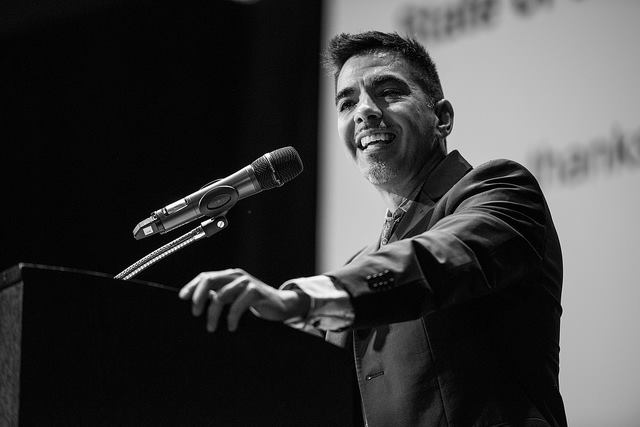What Makes a Good Executive Director/CEO + Board Chair Relationship?

Co-Author: Eddie Torres is the president & CEO of Grantmakers in the Arts, the only national association of public and private arts and culture funders in the U.S. Grantmakers in the Arts provides both service and leadership that advances the use of philanthropic and governmental resources to support the growth of the arts and culture. Eddie joined Grantmakers in the Arts after having served as deputy commissioner for cultural affairs for New York City. He holds a Master of Arts in Art History from Hunter College and a Master of Science in Management from The New School.
“There will be times of disagreement, but ultimately, both are getting to the same place and they need to be a united front.”
Glyn Northington
The executive director/CEO and board chair relationship can be challenging, in the way that any power-infused relationship can be. But, it can also be affirming, helpful, and supportive, especially through a period of big organizational changes. Glyn Northington is the board chair for Grantmakers in the Arts (GIA), where Eddie Torres became the new president and CEO in 2017. Not only did Eddie’s arrival mark a change in new leadership, but it also kicked off an office relocation from Seattle to New York, which meant rebuilding a staff, as well.
Through a period marked with big changes, tough decisions, and new faces, both feel grateful to have the other not only as a sounding board, but as a champion. Here are a few things they feel are common to any successful executive director and board chair relationship:
Be strategic in what skills you need
Eddie: We knew Glyn as the board chair would be a good fit for two reasons. First, his content expertise around finance and governance, as well as institutional memory, which Glyn had after six years on the board, four of those as treasurer. As GIA was transitioning as an organization and as I was as a new president and CEO, that constancy was a key factor in selecting a board chair. We also needed someone who would be a public advocate and in private, someone who won’t let you get away with anything…Glyn is forthright and knows how to engage in informed yet supportive critique. At a time when we were making a lot of decisions, that balance was important.
“No surprises!”
Eddie: One of the best pieces of advice I got when I took this job was “your board chair knows everything you know.” You can’t let a board chair be surprised. Case in point: last year we had to navigate a union strike at our big annual conference. At the welcome, Glyn kidded that we changed a bunch of venues, then sent a lot of emails, then made more changes, then sent more emails. And that’s true.
Glyn: From the board’s perspective, we had to be realistic about our expectations – Eddie didn’t have to have all decisions made regarding the strike, but needed to share ever-changing updates. Witnessing how Eddie communicated with us through that particular challenge built trust that in future navigations, we know he will be transparent. As a board chair, I’d never challenge Eddie in front of the board, even if we may disagree on the phone…when we’re together, we’re together for what’s best for the organization and the sector.
Clarity of roles is helpful, but not the end-all
Eddie: I’m usually somebody who advocates for greater clarity of roles, but experientially, I’m oriented toward greater flexibility. Clarity is the platonic ideal in any management situation, but whether you like flexibility or not, it will be required of you.
Glyn: Clarity of your respective roles is a jumping off point. Even though the board is the manager of Eddie, one of my critical roles is being an advocate for him because we know if he’s successful, so is the organization. Our trust comes from knowing we both care about the relationship and will work together for the sake of the mission of GIA.
Be flexible so you can best honor each other’s strengths
Eddie: As we transitioned board leadership from 2018 to 2019, Glyn has been able to help guide us through pivots while still maintaining rigor. For example, as we took a different approach to the budget, Glyn was supportive, but also made sure the process had integrity. I can get locked into my way of getting a thing done, whereas Glyn has been helpful in making sure our processes are responsive while we’re still doing work we can be proud of.
Glyn: I admire Eddie’s strategic vision. In his first year, he really took the time to assess where we were and where we could go. In his second year, he’s been focused on building on those strengths, rather and doing away with how we’ve done everything in the past, and he’s laid out a plan for how we can get where we want to go in the next 3-5 years. Sometimes a board will get short-term in focus; we might be thinking about conference sessions in the year ahead, whereas Eddie also gets us thinking about where the conference needs to be in three years.
Start with respect, build trust; liking each other will come
Eddie: Glyn and I have the rare luxury of having served on the board together for several years before I became president and CEO, and so we already knew each other. When it comes to a working relationship, I like people I respect and who I take seriously. Trust, and then affection, come from open and ongoing communication. Committing to a relationship that’s marked by transparency really does require both trust and respect.
Glyn: The ability to be honest comes when both the CEO and board chair have what’s best for the organization at the center. There will be times of disagreement, but ultimately, both are getting to the same place and they need to be a united front.
Be part of the conversation
Join Glyn and Eddie, as well as Adair Mosley of Pillsbury United Communities, at the 2019 Finance & Sustainability Conference on April 11 for their session on Change as Opportunity. Eddie will also be the keynote speaker for the conference.
Photo credit: Eddie Torres, taken by Eli Zaturanski
Related Resources
Board Communication: Reporting Financial Information
This resource outlines the types of financial reports that are needed by a board, as well as how to present…
Board Roles & Responsibilities
Legal compliance and financial oversight are certainly on the list of board responsibilities, but they’re not enough for effective governance….
Executive Director’s Guide to Financial Leadership
This guide outlines essential steps for Executive Directors regarding annual budgets, income, reserves, and financial governance.

